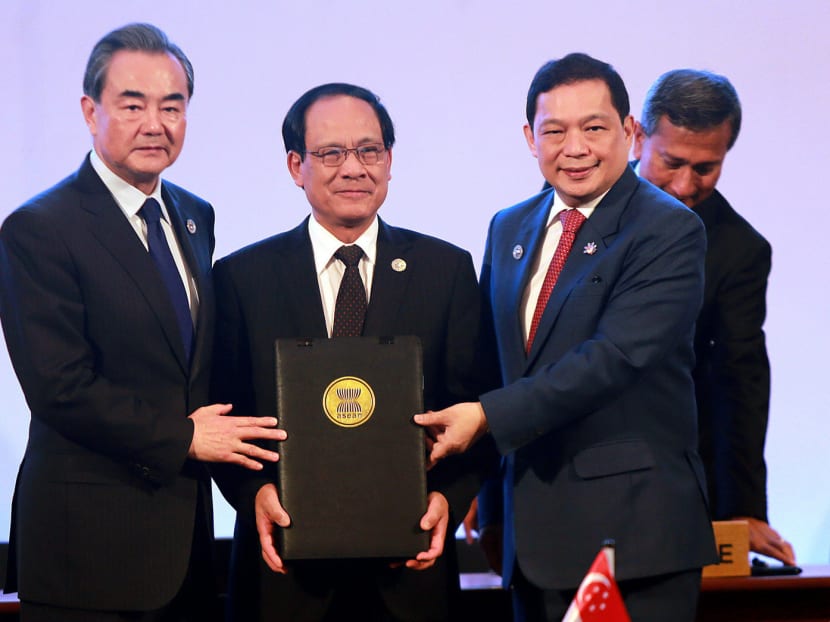Framework for South China Sea code adopted
MANILA — Foreign ministers of Southeast Asia and China yesterday adopted a negotiating framework for a code of conduct in the South China Sea, a move they hailed as progress in managing tensions in the disputed waters.

Chinese Foreign Minister Wang Yi, Philippine Foreign Affairs Undersecretary Manuel Teehankee and ASEAN Secretary-General Le Luong Minh hold the Memorandum of Understanding on the ASEAN-China Center at the 50th ASEAN Foreign Ministers' Meeting and its Dialogue Partners in Pasay City, metro Manila, Philippines August 6, 2017. Photo: Reuters
MANILA — Foreign ministers of Southeast Asia and China yesterday adopted a negotiating framework for a code of conduct in the South China Sea, a move they hailed as progress in managing tensions in the disputed waters.
Speaking to reporters after meeting his counterparts from the 10-member Association of South-east Asian nations (Asean), Chinese Foreign Minister Wang Yi said there had been “really tangible progress” so there was “a need to cherish momentum on the South China Sea”.
The adoption of the framework created a solid foundation for negotiations that could start this year and he added that any agreement made must be adhered to.
But he qualified that talks may start only if outsiders do not interfere, apparently referring to the United States, which Beijing has frequently accused of meddling in what it says is an Asian dispute that should be resolved only by the countries involved.
“If there is no major disruption from outside parties, then we will consider jointly announcing the official start of the code of conduct consultation during the November leaders’ meeting”, Mr Wang said, adding that the situation in the South China Sea should also be “generally stable’’.
“China and Asean have the ability to work together to maintain regional peace and stability and we will work out regional rules that we mutually agreed upon so as to open up a bright future for our future relations,” he said.
Minister for Foreign Affairs Vivian Balakrishnan also underscored the importance of the framework.
“This is an important document because it represents in a sense consensus and more important than that, a commitment on behalf of all the 10 Asean states and China to make progress on this long overdue issue,” he told reporters last night.
While noting that there were a lot of details to be sorted out and that negotiations could be difficult, he added: “The fact that there was progress on this front gave everybody the confidence and certainly elevated the tone and the mood of the discussions.”
The framework, first agreed by officials in May, seeks to advance a 2002 Declaration of Conduct of Parties in the South China Sea to prevent clashes from erupting in the strategic waterway.
All parties say the framework is only an outline for how the code will be established. But critics say the failure to outline as an initial objective the need to make the code legally binding and enforceable, and have a dispute resolution mechanism, raises doubts about how effective the pact will be.
China had long been perceived as delaying negotiations with Asean for the maritime code to allow it to launch and complete its land reclamations in the South China Sea without any such regulatory restrictions.
Mr Wang’s mention of the vague conditions can allow China to delay or halt the planned talks for any reason.
Malaysia, Taiwan, Brunei, Vietnam and the Philippines, all claim some or all of the South China Sea.
The framework has not been made public but a leaked two-page blueprint appears broad and leaves wide scope for disagreement.
It urges a commitment to the “purposes and principles” of the United Nations Convention on the Law of the Sea but does not specify adherence to it, for example.
Several Asean countries, including Vietnam and the Philippines, have said they still favour making the code legally binding, something experts say China is unlikely to agree to.
A Philippine government spokesman, Mr Robespierre Bolivar, also announced the adoption of the code’s framework, saying it symbolised a commitment to creating a “substantive and effective” code. He did not mention any preconditions.
He noted that there will be a meeting by the end of this month to discuss the modalities for the actual Code of Conduct with the approved framework as the basis for talks.
Asean foreign ministers also ended an impasse yesterday over how to address disputes with China in the South China Sea, issuing a communique that called for the avoidance of militarisation and noting some concern about island-building.
The regional grouping failed to issue the customary statement on Saturday, over what diplomats said was disagreement over how to address China’s activities in the region.
China is sensitive to even a veiled reference by Asean to its construction and arming of artificial islands.
It has placed missile batteries on some of them and built facilities that experts say are designed to accommodate fighter jets, but Beijing insists its activities are for defence purposes. AGENCIES






